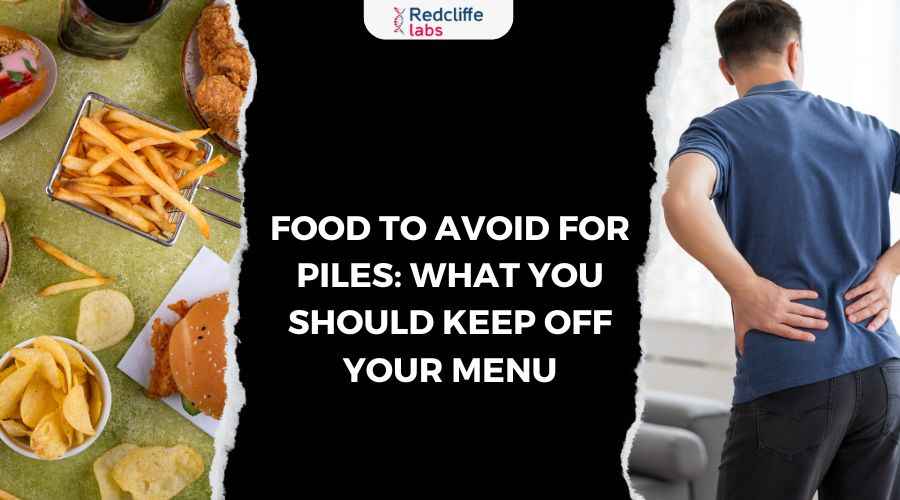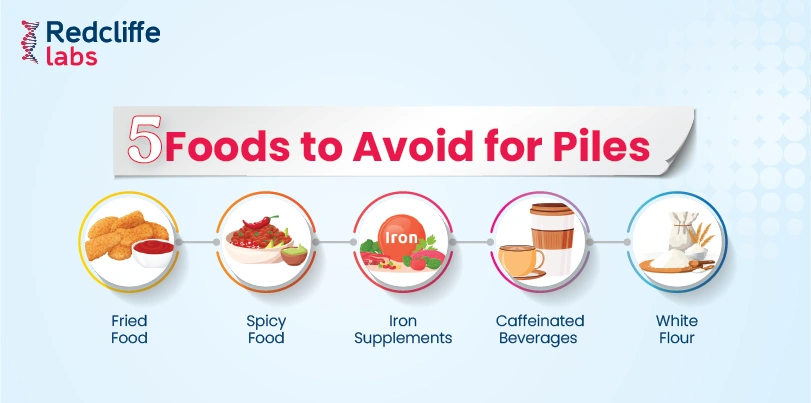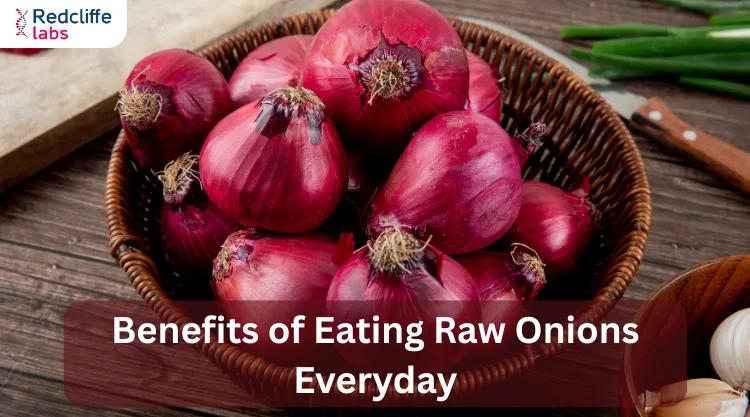Food to Avoid for Piles: What You Should Keep Off Your Menu

Medically Reviewed By
Dr Divya Rohra
Written By Muskan Taneja
on Feb 5, 2025
Last Edit Made By Muskan Taneja
on Jul 19, 2025

Studies have estimated that around 10 million people in India suffer from piles every year, and a survey found that around 11% of the population in India has piles. This is higher than the global prevalence of 4.4%.
Piles, or hemorrhoids, are very common in India. They may cause pain, bleeding, or discomfort during bowel movements. The major factor contributing to piles is not just a lack of awareness but also a lack of seriousness about managing the condition. Food is a key factor in controlling and preventing piles.
This blog will help you understand piles, identify foods to avoid, and adopt lifestyle modifications for better management. Let’s dive in!
What Are Piles?
Hemorrhoids or piles are swollen veins in the lower rectum and anus. Piles are similar to varicose veins. It can develop inside the rectum and also develop under the skin around the anus, called internal and external piles, respectively.
Internal Piles
Internal hemorrhoids lie inside the rectum. Usually, you can’t see or feel them. They rarely cause discomfort but can cause painless bleeding during bowel movements. Here are some foods to avoid if you have internal piles to prevent complications.
- Fast Foods
- Fluids like energy drinks, tea, and soda
- Spicy foods
- Iron Supplements
- Unripe fruits
External Piles
External hemorrhoids lie under the skin around the anus, which may cause bleeding, pain, and swelling. The blood pooled up can form a clot called a thrombus. This may result in swelling, inflammation, and severe pain. Here are some external piles of foods to avoid when managing symptoms and preventing serious complications.
- Dairy Products
- Fried Foods
- Alcohol
- Caffeinated Beverages
- Salty Foods
12 Foods to Avoid For Piles

Piles may cause serious health complications if left untreated. Various treatments can help with recovery. However, some foods are more likely to irritate your piles.
Here is a list of foods to avoid if you have piles to prevent discomfort and manage symptoms effectively.
- Dairy products
- Milk
- Yogurt
- Ice cream (especially full-fat varieties)
- Cheese
- Creamers
- Refined Flour
- White bread and bagels
- Pizza made with a refined flour crust
- Non-whole-grain pasta
- Market-prepared foods that contain bread
- Bakery items like muffins, pies, and cakes
- Red Meat
- Processed Meats
- Bacon
- Hot dogs
- Deli meats
- Sausage
- Cured or salted meats
- Fried Foods
- Salty Foods
- Spicy Foods
- Caffeinated beverages
- Alcohol
- Unripe fruits
- Refined Grains
- Iron supplements
There are some days when you feel more pain than some other days. It is your food and the kind of diet you consume. Foods play a vital role in worsening or improving your bowel movements. The above-listed foods are a must to avoid hemorrhoids.
Here is a table-wise classification of foods and reasons to avoid them.
| Foods | Reason to Avoid |
| Deep-fried and processed foods |
|
| Spicy Foods |
|
| Dairy Products |
|
| Alcohol |
|
| Unripe Fruits |
|
| Refined Grains |
|
| High Salted foods |
|
| Iron Supplements |
|
| Caffeinated Beverages |
|
| Processed Meat |
|
| Excessive Fiber | Fiber is useful to relieve supplements. However, excessive fiber consumption may cause side effects. Start with an optimal fiber intake and gradually increase your fiber intake. |
15 High-Fiber Foods for Piles

While some foods may worsen your symptoms, some may be highly beneficial. Typically, foods high in fiber are the ultimate solution for piles. The following are the foods to add to your daily diet.
- Legumes
- Whole grains
- Broccoli and other cruciferous vegetables
- Artichokes
- Root vegetables
- Squash
- Bell Peppers
- Celery
- Cucumbers and melons
- Pears
- Apples
- Raspberries
- Bananas
- Stewed prunes
- Fluids
| Best Food to Eat | Why eat? |
| High-fiber cereals |
|
| Beans |
|
| Fruits and Vegetables |
|
| Legumes |
|
| Whole Grains |
Whole grains like barley, corn, quinoa, brown rice, oats, and whole rye are beneficial for managing piles and should be included in your diet. |
| Cruciferous Vegetables |
|
| Root Vegetables |
|
| Bell Peppers |
|
| Chia Seeds |
|
| Figs or Anjeer |
|
| Nuts |
|
| Sweet Potatoes |
|
| Yogurt |
|
| Sprouts |
|
Also, read, Helping Guide to Fiber-rich Foods
8 Symptoms of Piles
Symptoms of piles depend on their type, i.e., internal or external hemorrhoids. Nonetheless, an individual may have the following symptoms of piles.
- Itching
- Bleeding
- Lumps
- Pain
- Mucus
- Swelling
- Feeling of fullness
- Discharge
8 Causes and 3 Health Complications of Piles
During piles, the veins around the anus tend to stretch under pressure and may swell. The following are the causes of piles.
- Being Obese
- Straining during bowel movements
- Sitting for a long period, especially on the toilet.
- Lifting heavy weights regularly
- Eating a low-fiber diet.
- Pregnancy
- Having chronic diarrhea or constipation
- Having anal sex
Piles may cause serious health complications. However, they are rare. These include:
- Blood clot—A clot may form in a hemorrhoid, which can be painful. Experts call this a thrombosed hemorrhoid.
- Anemia- It is very rare. However, piles may cause anemia.
- Strangulated Hemorrhoid- When the blood supply is cut off, it is called a strangulated hemorrhoid.
5 Tips to Cure Piles
Unfortunately, piles do not have a permanent cure, but they can be effectively managed.
- Exercise regularly for 30 minutes at least.
- Drink plenty of water to keep yourself hydrated.
- Try not to exert pressure while passing stools.
- Sitting in warm water, i.e., a sitz bath, can provide great relief.
- Apply creams, ointments, and suppositories to relieve swelling and discomfort.
A doctor may also prescribe surgical and non-surgical treatments to cure piles. Rubber band ligation, electrotherapy, and infrared coagulation are some non-surgical treatments, whereas hemorrhoidectomy and stapled hemorrhoidopexy are surgical procedures.
Key Takeaways
Piles can be painful and uncomfortable, but diet plays a key role in managing symptoms. Avoiding certain triggering foods can help manage symptoms, act as a natural supplement, and prevent serious health consequences. Fiber-rich foods—such as legumes, whole grains, fruits, and vegetables—support digestion and ease symptoms. If symptoms persist, consult a doctor.
FAQs
Ques1 Which fruit is not good for piles?
Ans1 Unripe fruits like figs, plums, bananas, and pomegranates are not good for piles. They can worsen the symptoms of piles.
Ques2 Which juice is good for piles?
Ans2 Juices that include aloe vera, beetroot, and pomegranate can help reduce inflammation, constipation, and digestion.
Ques3 What food shrinks hemorrhoids fast?
Ans3 Foods high in fiber, such as fruits, vegetables, legumes, nuts, and seeds, can help prevent hemorrhoids, treat severe symptoms, and soften and make stools easier to pass.



